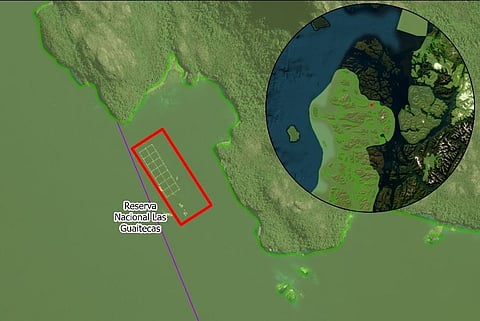

Map showing the location of the salmonid grow-out site CES Cholga of Multi X in 'Las Guaitecas' National Reserve, Aysén, Chile, where overproduction has been recorded.
Image: Chile's Superintendency of the Environment.
Chile's Superintendency of the Environment (SMA) announced it filed charges against Multi X after finding overproduction of salmon in different cycles between 2014 and 2021 in a site of the company located inside the National Reserve 'Las Guaitecas', in the commune of Cisnes, Aysén Region. The SMA has qualified the accusation as "extremely grave" due to the repetition of the infraction as well as the fact that the farming site where it occurred is within a state-protected wildlife area.
In February 2023, WeAreAquaculture reported the SMA had initiated a sanctioning procedure related to the overproduction of a salmonid grow-out site (CES in its Spanish acronym) of Multi X in 'Las Guaitecas' National Reserve. Now, we have learned the salmon farm under investigation is, specifically, the CES Cholga (RNA 110393).
The origin of the case lies in the complaints filed by the Committee for the Defense of Fauna and Flora (CODEFF) of Aysén, the 'Nuevo Amanecer' union (representing independent workers, artisanal fishermen, shellfish divers, and seaweed workers), and the Terram Foundation (foundation for the promotion of sustainable development). These organizations reported anaerobic conditions in some of the samples taken, as well as the maximum authorized overproduction concerning the company's environmental permits for its operations.
As a result of the complaint, the SMA requested information from Chile's National Fisheries and Aquaculture Service (Sernapesca) on the production of CES Cholga during the 2014-2015, 2016-2017 and 2018-2019 production cycles, in relation to the maximum production limits authorized in its Environmental Qualification Resolution (RCA), detecting that production exceeded the permitted limits in each of those cycles. Likewise, Chile's Superintendency of the Environment also analyzed the results of the Environmental Information Sampling (INFA), which showed anaerobic conditions for all cycles with overproduction.
In addition, the SMA conducted a new evaluation of the state of compliance of the CES Cholga through the analysis of the information on mortality, harvest, and stocks declared by the owner, as well as the receipt of raw material reported by the Processing Plants in the Traceability platform, for the production cycles 2020-2021 and 2022-2023, where findings of overproduction were also detected, and the existence of anaerobic conditions in the CES was also evidenced.
Based on the above, the Superintendency of the Environment issued an "extremely grave" accusation against the salmon company. The SMA explained that the infraction was so qualified "for constituting recidivism or reiteration of an infraction qualified as serious in Article 36 of the LO-SMA."
"Likewise, the infringement was also considered to be serious because it constituted environmental damage susceptible to repair; because it was a serious breach of the measures to eliminate or minimize the adverse effects of the project; as well as being an unauthorized activity carried out inside a state-protected wildlife area," the SMA added in its release.
"This formulation of charges is supported, after all the analysis of information carried out by this Superintendence regarding the production evaluation of CES Cholga, as well as its maximum production limits authorized in its environmental permit, and where it has been evidenced, that the company has presented a repeated overproduction between the years 2014 and 2023," pointed out Oscar Lear, Head of the SMA's Regional Office of Aysén.
"This particular case is especially relevant because it is located in a protected area with key conditions for ecosystem balance," added the Superintendent of the Environment, Marie Claude Plumer. "The call is always for the owners to comply with environmental regulations and with what they have been authorized to operate. It is an imperative and part of the rules of the game for all those who develop an economic activity," she added.
In recent years, Chile has strengthened its control of the aquaculture sector through different actions and strategies. "Since October 2023, we began implementing a system to monitor the production cycles of salmonid grow-out sites (CES) with the aim of preventively informing industry owners about their estimated production concerning the maximum authorized in their Environmental Qualification Resolutions (RCA)," explained Superintendent Plumer. "With these reports, the holders are alerted regarding how their production level is going as allowed in their environmental permit so that they can adjust to it."
In the case of "extremely grave" infractions, such as the one Multi X is now facing, holders are exposed to fines of up to 10,000 Annual Tax Units (UTA), along with revocation of the RCA or closure. In this case, the Chilean salmon company could face a fine of up to ten thousand UTA, equivalent to more than CLP 7.892 million (EUR 7.8 million / USD 8.3 million).
Multi X now has 10 working days from the notification of the charges to present a compliance program and 15 working days to present its defense. It should be recalled that this is not the first time that the SMA has sanctioned Multi X. In 2022, the Chilean Superintendency of the Environment issued provisional measures against it due to the use of chemicals in the CES Chaparano (RNA 103957), located in the district of Cochamó, Los Lagos Region.
Moreover, in May of this year, following a complaint by Sernapesca, a judgment of the Supreme Court of Chile fined Multiexport SA (Multi X's official corporate name) for repeat offenses regarding surveillance of Infectious Salmon Anemia Virus (ISA) in farming centers. In addition to Multi X, this judgment also ratified a fine for the same reason against Blumar.
